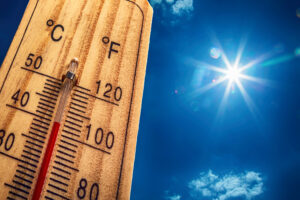
According to the CDC, about 700 people die from extreme heat each year. And as temperatures increase and stay there longer, that number is likely to go up.
People battling chronic conditions like heart disease or lung issues may be at the highest risk, although nobody is immune from the potential hazards of the heat. Those older than 65 are also at high risk.
Here are some ways to stay safe and protect yourself from extreme heat.- Stay hydrated. Drink more water than normal, even if you are not thirsty.
- Seek air conditioning: If you have air conditioning, have it turned on and stay indoors. If you don’t, seek it out. Go to a movie theatre, a friends’ place, or a community cooling station.
- Do not rely on a fan during an extreme heat event. Fans will blow around hot air and do little to keep your temperature down in extreme heat.
- Do not use the stove or oven for cooking. It will boost the temperature in your home.
- Limit outdoor activity, particularly midday when the sun is at its hottest.
- Wear lightweight, loose, and light-colored clothing
- Take cool showers and baths
- Check on friends and family and ask them to check on you.
- If you are outside, wear sunscreen and reapply. Sunburn can impact your body’s ability to cool itself.
The heat is no joke, so be careful not to underestimate it. It can be even more dangerous when humidity factors in because sweat does not evaporate as quickly.
Be safe during these heat waves and do your best to establish safe practices.